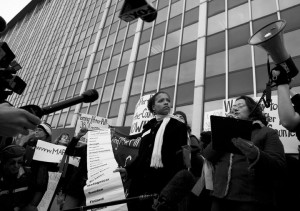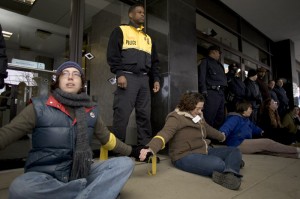
Stephanie Seguin, National Women’s Liberation leader and Tummino v. Hamburg plaintiff, delivers a press statement at the FDA headquarters in January 2005. Photo courtesy of National Women’s Liberation.
by National Women’s Liberation
On April 5, a U.S. federal judge in Tummino et al. v. Hamburg ordered that the Morning-After Pill be made available “without a prescription and without point-of-sale or age restrictions within thirty days.”
Until the court’s ruling today, emergency contraception was kept behind a pharmacy counter, only available without a prescription for women 17 and older, forcing all women to prove their age to buy it. With this court ruling, the Morning-After Pill can be stocked on any shelf in any store, right next to the condoms, aspirin, or shampoo. No prescription or identification will be needed to buy it.
The Morning-After Pill (also known as Plan B One-StepTM, Next Choice®, or “emergency contraception”) works to prevent pregnancy up to five days after sex, however it is most effective within the first 24 hours. The Morning-After Pill (MAP) is not the same thing as RU-486, which induces an abortion. If you are pregnant, the Morning-After Pill will not work. (For more on how the Morning-After Pill works, go to www.not-2-late.com.)
The Decision
Judge Edward R. Korman (U.S. District Court for the Eastern District of New York) found that “[t]hese emergency contraceptives would be among the safest drugs sold over-the-counter.”1
On Dec. 7, 2011, the FDA Commissioner Margaret Hamburg issued a statement that “Plan B One-StepTM is safe and effective and should be approved for nonprescription use for all females of child-bearing potential,” but the Secretary of Health and Human Services Kathleen Sebelius, in an unprecedented move, immediately overruled the FDA’s decision.
Referring to this as “political interference” from the White House, the judge stated “the motivation for [Secretary Sebelius’] action was obviously political. … [I]t was an election year decision that ‘many public health experts saw as a politically motivated effort to avoid riling religious groups and others opposed to making birth control available to girls.”
Citing the Obama administration’s “unjustified departures” from established policy to make safe medications available to the public, the court found that the administration invoked arguments that were an “excuse to deprive the overwhelming majority of women of their right to obtain contraceptives without unjustified and burdensome restrictions.” This ruling is a significant victory in the fight for reproductive rights, in line with the landmark Supreme Court decisions Griswold v. Connecticut (1965) and Eisenstadt v. Baird (1972 ) ,which together legalized birth control in the United States, first for married couples in Griswold, and then for everyone else in Baird.
Plaintiffs Speak Out
Plaintiffs in the lawsuit included nine grassroots feminist activists with National Women’s Liberation (NWL) plus 15-year-old Gainesville resident Anaya Kelly. Organizational plaintiffs include: the Association of Reproductive Health Professionals and the National Latina Institute for Reproductive Health.2
“National Women’s Liberation believes that any female old enough to get pregnant is old enough to decide that she doesn’t want to be pregnant. This decision to grant immediate access to the Morning-After Pill is a huge step forward in the fight for women and girls to be able to control the course of their lives,” said Plaintiff Stephanie Seguin, NWL-Gainesville Chapter organizer.
Plaintiff and NWL-New York Chapter organizer Jenny Brown said, “Women and girls have won a landmark victory today for reproductive justice. The denial of full access to the Morning-After Pill has been an outrageous political decision and wholly without scientific basis—under both the Bush and Obama Administrations. The court’s decision dramatically expands access to a safe and effective form of birth control and is a ruling in favor of science and for justice for women.”
Plaintiff and NWL New York Chapter organizer Erin Mahoney said, “The Morning-After Pill was already available without a prescription in at least 63 other countries, including the United Kingdom, France, Denmark and Ghana. We are glad the U.S. has finally caught up to women around the world, but it shouldn’t have taken over a decade of pressure from feminists, our allies and a lawsuit.”
Long-Running Fight
Feminists in the University of Florida (UF) chapter of the Campus National Organization for Women (NOW) first worked for increased access at the UF Infirmary in 1991, where a pharmacist was refusing to dispense the Morning-After Pill—which was then prescription-only—to women who had prescriptions. UF Campus NOW leaders were sparked by feminists then working at the feminist-run abortion clinic Gainesville Women’s Health Center, who first taught them how the MAP actually worked and why women needed it,
Campus NOW organized a campaign to force the resignation of this pharmacist, Michael Katsonis. This experience meant that these NOW activists, who later became organizers in Gainesville Women’s Liberation and National Women’s Liberation, were wary of pharmacist-controlled dispensing and opposed the half-measure of putting the morning-after pill “behind the counter.”
National Women’s Liberation’s Role
For over a decade, grassroots feminist activists with National Women’s Liberation (NWL)—who include lead Plaintiff Annie Tummino—have been waging the most important fight in decades to expand access to birth control in the United States: to make the Morning-After Pill available over-the counter without any restrictions on age or how it can be sold.
NWL led the grassroots fight for unrestricted access to the Morning-After Pill in the U.S., from sitting in at the FDA, sending the FDA thousands of petition signatures, speaking out at Health and Human Services, to filing this lawsuit. NWL members, working with NOW chapters in Gainesville and New York, have been at the forefront of this struggle to win unrestricted access to the Morning-After Pill in the United States. Due to this organizing, all women won a huge victory in 2006 when the FDA agreed to eliminate the prescription requirement for women over age 18, and another in 2009 when the judge ordered the FDA to eliminate the prescription requirement for girls aged 17.
In 2001, NWL members active with the NOW-New York City chapter noticed that the Center for Reproductive Rights had launched a national petition, asking the FDA to switch Plan BTM from a prescription medication to an over the counter product, with no restrictions. Because NWL believed that birth control should be available without restriction, the group decided to join the campaign.
Starting early in 2003, NWL members also active as leaders in the NOW chapters at the University of Florida, the Gainesville community, and in New York State petitioned and held workshops within state NOWs and National NOW to encourage all NOW chapters around the country to participate in a national campaign of speakouts—women testifying from our own experience about why we needed the Morning-After Pill to be over-the-counter.
In December 2003, over a dozen women from New York City and Gainesville testified at the hearing where the FDA advisory committees were considering granting over-the-counter status for the Morning-After Pill. These women spoke out from their own experience about why they needed the MAP, and how in dozens of other countries, the MAP was already available without a prescription. The advisory committees voted 23-4, that the FDA put the MAP over-the-counter, but due to Bush administration pressure, the FDA decided to keep the MAP prescription-only.
In January 2004, deciding to up the ante on the FDA, a conference of members of Gainesville Women’s Liberation and Redstockings Allies & Veterans agreed to launch a campaign of civil disobedience. This organizing was carried out under the tongue-and-cheek name, “The Morning-After Pill Conspiracy” (www.mapconspiracy.org, see Timeline3). MAP Conspiracy organizers gathered thousands of signatures of people willing to defy the FDA’s prescription requirement; all signers pledged to “give the morning-after pill to a friend” any time she needed it.4
Later in 2004, because NWL had waged nearly two years of an organizing campaign for the MAP, the Center for Reproductive Rights approached members to be plaintiffs in a lawsuit against the FDA to remove the prescription requirement on the Morning-After Pill.
Throughout history, social movements have established court cases to help advance people’s rights. The Brown v. Board of Education Supreme Court ruling was an example of where a civil rights organization, the National Association for the Advancement of Colored Persons (NAACP), specifically developed a court case in order to advance the civil rights movement goal of integrated education. Labor unions and social justice groups, including the National Organization for Women, have long-used this strategy as well.
Similarly, the Tummino case is an example of the organized feminist movement choosing to wage a legal battle to advance a grassroots organizing campaign for women’s freedom. A court case alone will not win freedom for women; a strong and active dues-paying feminist membership5 is the key element in the freedom fight, and it is needed to capitalize on the victory of a court case. If the Obama administration chooses to appeal the current decision, the need for an organized and dues-paying movement standing up to defend women’s rights will be crystal clear.
Join Us!
To protect hard won gains for birth control and to join the fight for women’s freedom,
• Contact National Women’s Liberation at phone (347) 560-4695, nwl@womensliberation.org, www.womensliberation.org, or on our chapter Facebook pages.
• Make a donation, become a member, or come to a meeting of NWL chapters in Gainesville, Florida, and New York City, open to all women.
This article was written by Andrea Costello, Co-Counsel for the Tummino v. Hamburg case, and Attorney, Partnership for Civil Justice Fund; Annie Tummino, Lead Plaintiff, Tummino v. Hamburg, and Coordinator, National Women’s Liberation; Alexandra Leader, Organizer, National Women’s Liberation; and Kendra Vincent, Chair, National Women’s Liberation Gainesville chapter.
Notes
1. Read the court’s full opinion in Tummino v. Hamburg at the Partnership for Civil Justice Fund’s website, www.justiceonline.org/docs/tummino-order-on.pdf.
2. See also press release from Partnership for Civil Justice Fund, dated April 5, 2013: www.justiceonline.org/commentary/court-orders-fda-remove-restrictions-morning-after-pill.html
3. See www.mapconspiracy.org/timeline.html.
4. “Feminists promise civil disobedience to get Morning-After Pill over the counter,” The Gainesville Iguana, Jan./Feb. 2004. See www.afn.org/~iguana/archives/2004_01/20040102.html
5. See buttons tab on Redstockings website at: www. Redstockings.org.

